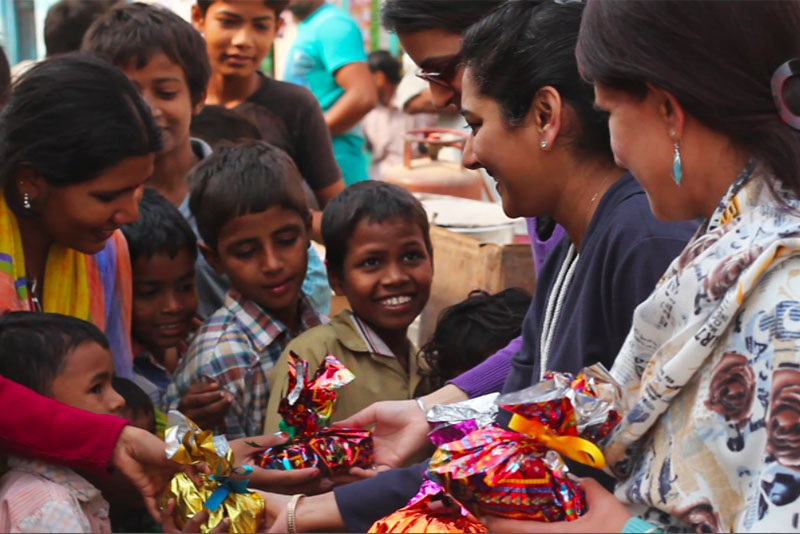
Sometimes a sign is all you need to swing into motion and get started on something big.
After the unexpected razing of part of a New Delhi industrial slum called “J. J. Camp” displaced 10 families, the team members at NOVICA India knew it was just the right time to implement one of the very first NOVICA Happiness Projects, right in their own backyard.
After doing a little community outreach in J. J. Camp and distributing care packages, Anvita, Tiali, Nidhi, and Ratna bring us up-to-date on their efforts to spread a little happiness in J. J. Camp — and we are so excited at the ideas that are beginning to surface.
We know that Happiness Projects will only work when we’re truly serving the needs of the community — every neighborhood is different and faces unique challenges.
The first step is listening. The residents of J. J. Camp had many diverse stories to share when our team visited, but as Anvita tells us, “two things were most striking — friendliness and hope. Everybody spoke to us very nicely, answered all our questions and took us all around, even into their homes.”
A day in their lives
Kanak, a nine-year-old girl living in J. J. Camp, exemplified this hope and optimism when interviewed by Nidhi. Living in a 50-square-foot apartment with her parents and two siblings, she rises with the sun every day to clean the house, prepare dough for rotis (bread), and make lunch for her brother before leaving for school in the morning. A bright student, she wishes to become a doctor one day.
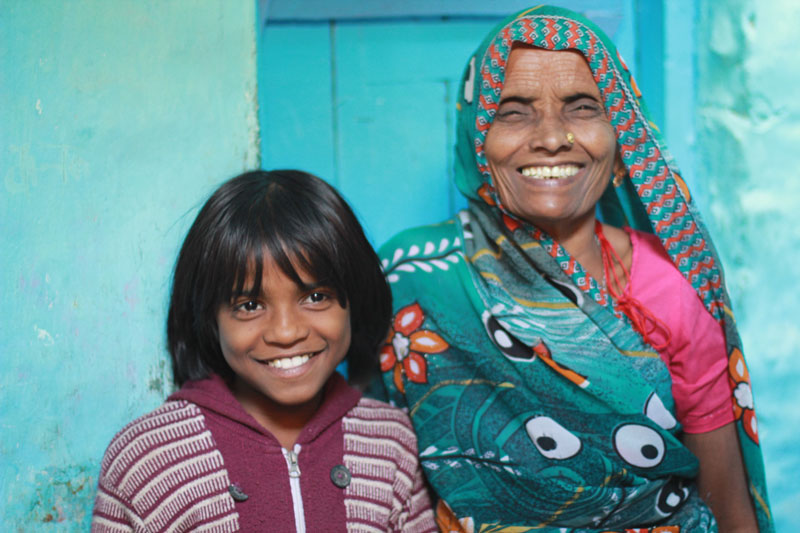
Even with such adult responsibilities and aspirations, Kanak still finds time to be a kid, although the conditions of life in the industrial slum often make doing so difficult. Kanak enjoys playing “kam kam kola” (“tag”) and Hide-and-Seek with the other children of the slum, yet they often must play in construction areas on the side of the road. And like many girls, she wants a doll to play with — but although her father works in a toy factory, her family cannot afford one.
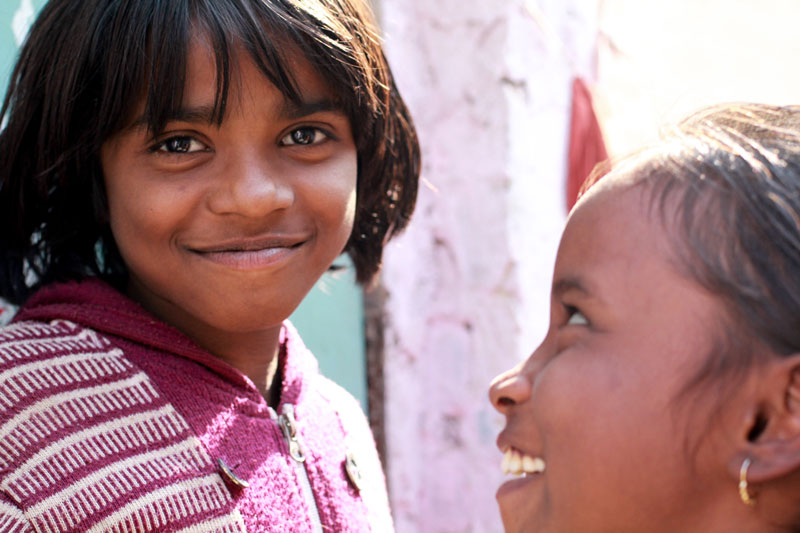
Yashwant, 22, is another of J. J. Camp’s youth whose childhood has been altered by the daily challenges of life in a slum. When interviewed by Tiali, the aspiring businessman noted that with no playing grounds available, he and his friends must play cricket in a nearby abandoned property.
For Yashwant and many other youths, the need to contribute to the family income also forces them to drop out of school, cutting childhood short. Nowadays, Yashwant and his brother run a mobile repair shop that supports their family of eight. And although he regrets not being able to complete his studies, Yashwant is happy to help his family.
“Our community is a very tight-knit one,” he said. “We help each other in times of trouble and stay in unity.”
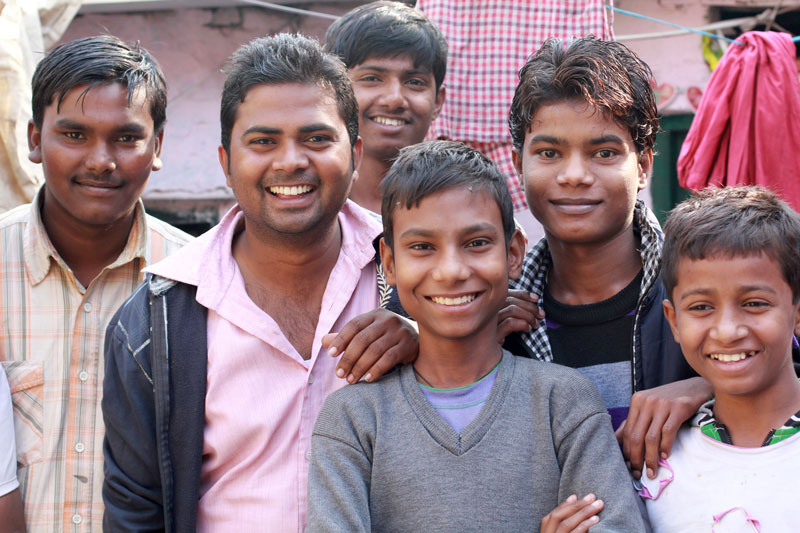
Although his and his friends’ outlooks remain positive, Yashwant also identified another challenge to a happy childhood in J. J. Camp: hygiene and access to healthcare. He explained that the nearest government dispensary doesn’t operate at all times, and private clinics are unaffordable. “The only option for us is to go to the government hospital in emergencies,” he said. “Sometimes due to lack of quick help, many succumb to their injuries and illnesses.”
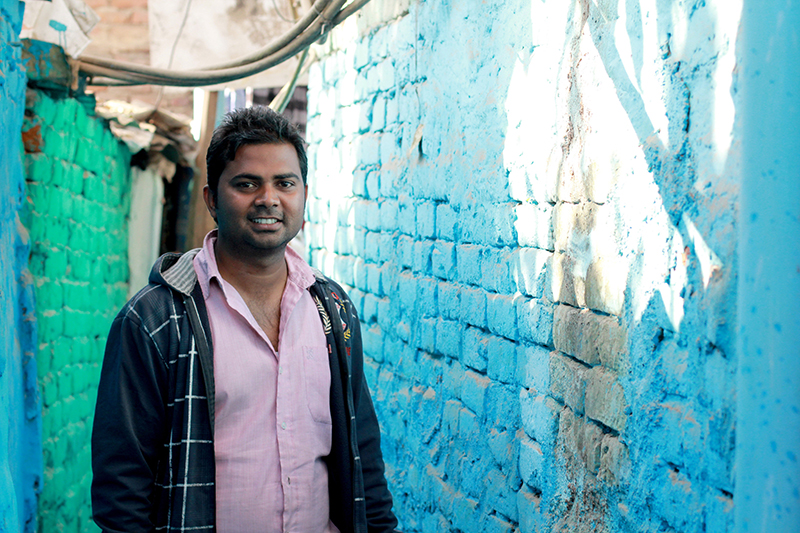
Anita Devi, another denizen of J. J. Camp, expressed the same uneasiness about lack of access to affordable healthcare when interviewed by Ratna.
When interviewed by Anvita, a middle-aged woman named Chandmati inadvertently reinforced these concerns about hygiene and healthcare in the slum. Sitting hunched in a squalid crossroad labyrinth of the slum settlement, washing clothes in a bucket, she nonetheless beamed while she said matter-of-factly, “this is the way we live; this is all you’ll see here.”
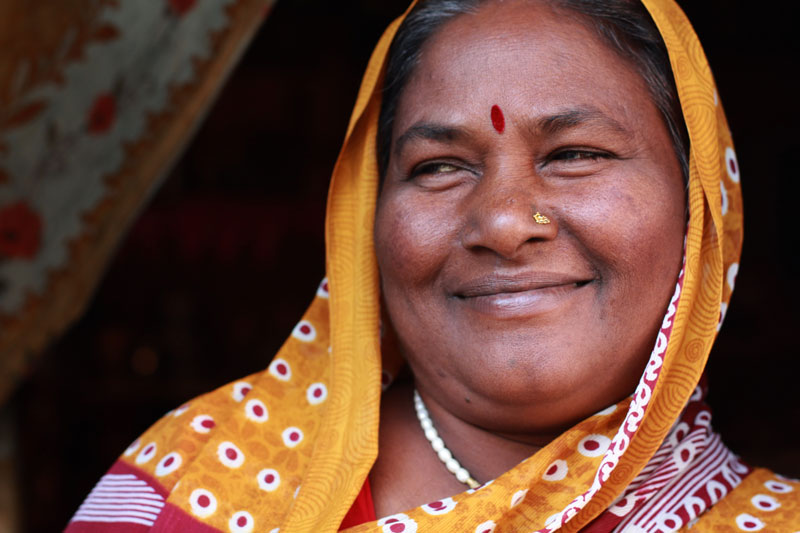
Living in potentially hazardous conditions certainly seems to shape life in J. J. Camp, as Anvita observes. The alleyways are lined with open drains, and in some parts there are only drains covered with stones or wooden planks that serve as walkways. “The open drains [do] seem to be an open invitation to diseases,” says the regional director of her trip to the slum. “However, health issues [do] not seem to be a concern.”
Later, Chandmati revealed the often tragic consequences of the health and hygiene problems that plague the community. Tearfully, she recalled the loss of her 22-year-old son to an “unknown” ailment — seemingly unaware of the probability that the slum’s unsanitary living conditions contributed to his disease.
Taking the next step
After visiting the residents of J. J. Camp and listening to their stories, it became clear to Anvita, Tiali, Ratna, Nidhi, and the team the kind of help that was needed. Anvita notes that with most of J. J. Camp having access to basic amenities like water, electricity, food and clothing, there were two possible ways to address some major challenges that the community faced:
- The challenges of life in the slum put pressure on the children to take on adult responsibilities, while simultaneously depriving them of opportunities and safe places to play. One way to alleviate these burdens and spread a little joy would be to arrange for tickets, transportation, and chaperones for a visit to a zoo or amusement park and give the children a chance to “just be kids.”
- To address the bigger problems of health and hygiene and to build long-term happiness in J. J. Camp, NOVICA India wants to run a cleanliness drive for kids. By talking to parents and children about the importance of keeping the children clean and how to do it, as well as distributing toiletries kits, the team hopes to help residents reduce the frequency of expensive emergency room visits and prevent hygiene-related diseases from troubling the community. Continuing this dialogue into the future, the team aspires to make health and hygiene awareness a fixture of life in the slum.
A happier future for our neighbors
Certainly, New Delhi’s J. J. Camp faces major problems that threaten the health and dignity of its inhabitants. And while alleviating these problems is indeed a tall call to action, as neighbors of this community we have an obligation to try in any way we can.
We’re already local neighbors of Kanak, Yashwant, Chandmati and Anita Devi, with J. J. Camp situated just outside the NOVICA India office complex. But we become global neighbors when we hear their stories and use the resources of our international community to help them achieve greater happiness.
Many thanks to Anvita, Nidhi, Tiali, Ratna, and the rest of the team at NOVICA India — we are so inspired by this Happiness Project and can’t wait to see the results!
STAY TUNED FOR MORE ON THIS PROJECT SOON.

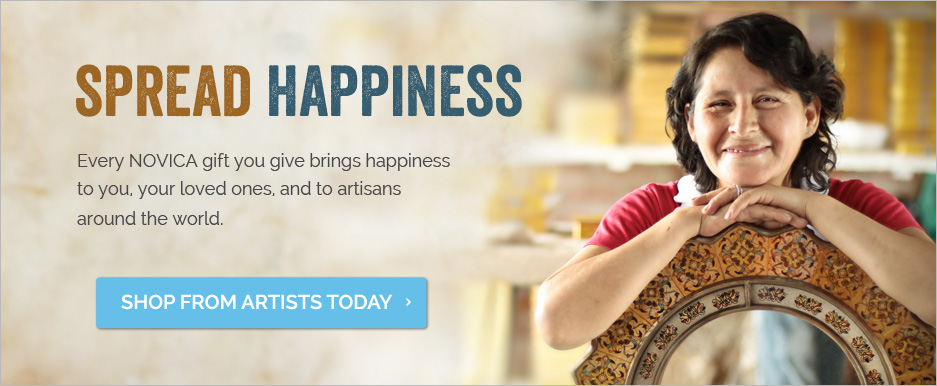




” …Taking the next step
1. The challenges of life in the slum put pressure on the children to take on adult responsibilities, while simultaneously depriving them of opportunities and safe places to play. One way to alleviate these burdens and spread a little joy would be to arrange for tickets, transportation, and chaperones for a visit to a zoo or amusement park and give the children a chance to “just be kids.”
2. To address the bigger problems of health and hygiene and to build long-term happiness in J. J. Camp, NOVICA India wants to run a cleanliness drive for kids. By talking to parents and children about the importance of keeping the children clean and how to do it, as well as distributing toiletries kits, the team hopes to help residents reduce the frequency of expensive emergency room visits and prevent hygiene-related diseases from troubling the community. Continuing this dialogue into the future, the team aspires to make health and hygiene awareness a fixture of life in the slum. …”
… so what’s the next step, and how can we help / participate?
Alex Avellaneda
Hi Alex,
This is a happiness project in development – so we’ve just completed the fact finding stage. Over the next month our India team will determine the exact course of action and the practical logistics for making one of these 2 options happen – and we’ll post a full report of the event once it takes place. We anticipate several happiness projects will happen within the JJ Camp community over the coming months – so please stay tuned!
In terms of help / participation, we will soon be giving people the option to make a contribution to our Happiness Project Fund while in our online checkout. As our happiness projects develop and fact finding missions take place around the world, we hope to offer our community members the ability to vote for courses of action on select projects – giving everyone a voice on how we spread happiness.
Hi Judd,
That’s a fantastic project!
It’d also be great to contribute directly, i.e. without having to go through online checkout.
Cheers,
Alex Avellaneda
[…] been over a year since we launched our first happiness project in India and since then we’ve learned so much! We’ve been to many places, and met many […]
[…] Happiness Project in their own backyard, in a New Delhi industrial slum called “J. J. Camp.” While distributing care packages and doing a little community outreach in preparation for the projec… they met Kanak, a nine-year-old girl living in J. J. Camp in a 50-square-foot apartment with her […]